Caring for your car’s paint goes beyond routine washing and waxing. Ceramic coatings have emerged as a game-changer in automotive care, offering long-lasting protection and a showroom shine. But, a pressing question often arises: Can I ceramic coat my own car?
In this discussion, we will delve into the world of ceramic coatings, their pivotal role in safeguarding your vehicle’s finish, and whether taking the DIY approach is a viable option.
What is ceramic coating?
Ceramic coating, often referred to as nano-ceramic coating, is a revolutionary automotive protective solution. It’s a liquid polymer applied to a vehicle’s exterior surfaces, including the paint, glass, and wheels.
This coating forms a semi-permanent bond, creating a durable and hydrophobic layer that shields the vehicle from environmental contaminants, UV rays, water spots, and minor abrasions. The benefits of ceramic coating are extensive, including long-lasting protection, a deep gloss finish, enhanced hydrophobicity, and UV protection.
It outperforms traditional waxing and sealants, offering superior defense and longevity for your vehicle’s surfaces, albeit with a more intricate application process.
Definition and Purpose of Ceramic Coating:
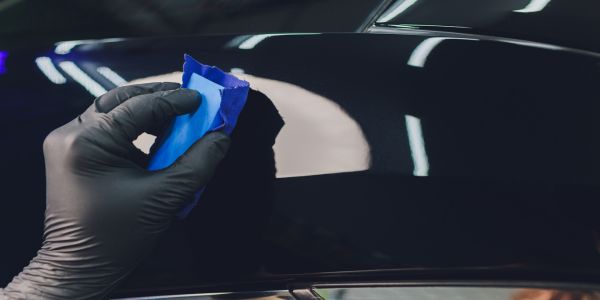
Ceramic coating, also known as nano-ceramic coating, is a liquid polymer applied to a vehicle’s exterior surfaces, including the paint, glass, and sometimes wheels. Its primary purpose is to provide a protective shield against various environmental contaminants, UV rays, water spots, and minor abrasions. Unlike traditional waxes or sealants, ceramic coatings create a semi-permanent bond with the vehicle’s surfaces, forming a durable and hydrophobic layer.
Benefits of Ceramic Coating:
The advantages of ceramic coatings are manifold. They include:
- Enhanced Protection: Ceramic coatings offer exceptional protection against bird droppings, tree sap, road salt, and other pollutants, preventing them from etching or staining the paint.
- Longevity: While traditional waxes may last a few weeks, ceramic coatings can endure for years with proper maintenance.
- Gloss and Shine: Ceramic coatings enhance the vehicle’s appearance, creating a deep gloss and reflective finish that surpasses that achieved with wax.
- Hydrophobicity: Water and contaminants bead up and slide off easily, making cleaning and maintenance more manageable.
- UV Protection: Ceramic coatings shield the paint from harmful UV rays, reducing the risk of fading and oxidation.
Comparison to Traditional Waxing and Paint Sealants:
In contrast to traditional waxing and paint sealants, ceramic coatings provide longer-lasting protection and superior gloss. While wax may require reapplication every few weeks, a ceramic coating can last for years.
Additionally, ceramic coatings offer enhanced resistance to environmental contaminants and UV damage. However, their application process is more complex and typically requires professional expertise or careful DIY execution.
Can I do it myself?
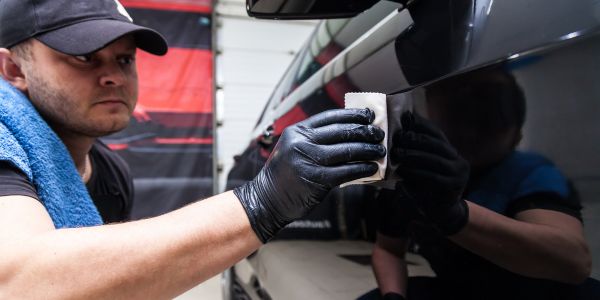
Pros of DIY Ceramic Coating:
Cost-Effectiveness: One of the significant advantages of opting for a DIY ceramic coating is cost savings. Professional ceramic coating services can be expensive, and doing it yourself can significantly reduce the overall expenditure.
Convenience: DIY ceramic coating kits are readily available, allowing you to apply the coating at your convenience, without scheduling appointments or waiting for a professional service.
Satisfaction of Doing It Yourself: Applying a ceramic coating yourself can be a rewarding experience. Achieving a high-quality finish through your efforts can provide a sense of accomplishment and pride in your car’s appearance.
Cons of DIY Ceramic Coating:
Skill and Knowledge Requirement: Properly applying ceramic coatings requires a good understanding of the process, including surface preparation, product selection, and the correct application technique. Lack of knowledge can lead to subpar results or even damage to your vehicle.
Time-Consuming Process: DIY ceramic coating can be time-consuming. The application process involves multiple steps, including thorough cleaning, surface decontamination, and precise coating application, which can take several hours to complete.
Potential for Mistakes and Damage: Inexperienced DIYers may make mistakes during the application process, such as uneven coating or product misuse, leading to unsatisfactory results or, in some cases, damage to the vehicle’s finish. Correcting these errors can be challenging and costly.
Deciding whether to DIY ceramic coating or seek professional assistance depends on your level of expertise, available time, and willingness to learn. While it can be a cost-effective and satisfying endeavor, it’s essential to invest the time and effort to acquire the necessary knowledge and skills for a successful outcome.
Steps to ceramic coat your own car
Gathering the Necessary Materials:
Before you start, ensure you have all the required materials, including the ceramic coating product, applicator pads, microfiber towels, a wash mitt, a clay bar (for decontamination), and a paint correction kit (if necessary).
Preparing the Car’s Surface:
Washing and Drying the Car: Thoroughly wash your car using a pH-neutral car wash soap to remove dirt and contaminants. Rinse and dry it completely with a microfiber towel to avoid water spots.
Surface Decontamination: Use a clay bar to remove embedded contaminants like tar, tree sap, or industrial fallout. This step ensures a clean surface for the coating to bond to.
Paint Correction (If Needed): Inspect your car’s paint for swirl marks, scratches, or imperfections. If necessary, perform paint correction using a polish or compound to achieve a smooth surface.
Application Process
1. Washing and Drying the Car:
- Begin by washing your car thoroughly using a high-quality pH-neutral car wash soap. This step removes dirt, grime, and contaminants from the paint surface.
- Rinse the car thoroughly with clean water.
- Dry the car completely using microfiber towels to prevent water spots.
2. Surface Decontamination:
- After washing, use a clay bar and a clay lubricant to remove embedded contaminants such as tar, tree sap, or industrial fallout. This process ensures a clean and smooth surface for the ceramic coating.
3. Paint Correction (If Needed):
- Carefully inspect your car’s paint for imperfections like swirl marks, scratches, or oxidation.
- If necessary, perform paint correction using a machine polisher, compound, and polish to restore the paint’s clarity and smoothness.
4. Applying the Ceramic Coating:
- Work in a shaded, well-ventilated area with minimal dust and contaminants in the air.
- Apply a small amount of ceramic coating to the provided applicator pad.
- Work on one small section of the car at a time (typically 2’x2′ or similar).
- Apply the coating in a crosshatch or linear pattern, ensuring even coverage.
- Allow the coating to sit on the surface for the manufacturer-recommended time, usually 1-5 minutes. The coating will begin to bond with the paint during this time.
5. Curing and Protecting the Coating:
- After the specified time, use a clean, dry microfiber towel to carefully wipe off the residue. Be gentle to avoid creating micro-scratches.
- Continue applying the coating section by section until the entire car is coated.
- Once the entire car is coated, allow the ceramic coating to cure for the manufacturer-recommended time, typically 24-48 hours.
- During the curing period, avoid exposure to moisture, rain, or other environmental factors.
Following these steps diligently will help you achieve a professionally applied ceramic coating on your car, providing long-lasting protection and a stunning finish.
Tips and Precautions for DIY Ceramic Coating

Importance of Following Instructions:
Read the Manufacturer’s Instructions: Always carefully read and follow the manufacturer’s instructions provided with the ceramic coating product. These guidelines are essential for achieving the best results and ensuring the coating’s durability.
Work in Ideal Conditions: Apply the coating in a controlled environment with minimal dust, moderate temperature, and low humidity. Avoid direct sunlight or windy conditions, as they can affect the application process and final results.
Proper Timing: Pay attention to the recommended waiting times for each step of the application process, from applying the coating to wiping off residue and curing. Timing is crucial for a successful outcome.
Choosing the Right Ceramic Coating Product:
Research and Compatibility: Before purchasing a ceramic coating product, research different brands and products to find one that suits your needs and experience level. Ensure that the chosen product is compatible with your car’s paint and any existing coatings.
Consider Your Skill Level: If you are new to ceramic coating, opt for a user-friendly product with clear instructions. Experienced detailers may choose more advanced coatings.
Read Reviews: Look for online reviews and recommendations from other users to gauge the product’s performance and durability.
Surface Preparation is Key:
Thorough Cleaning: Ensure your car is meticulously cleaned and free from contaminants before applying the coating. Any dirt or imperfections left on the surface can affect the bonding and final appearance of the coating.
Paint Correction: If your car’s paint has visible imperfections like swirl marks or scratches, consider performing paint correction before applying the coating. A polished and smooth surface enhances the coating’s performance.
Use Proper Safety Equipment:
Protective Gear: Wear appropriate personal protective equipment, such as gloves and safety glasses, to minimize contact with the coating and chemicals.
Start with a Test Area:
Before applying the coating to the entire car, consider starting with a small, inconspicuous test area to ensure you are comfortable with the application process and the product’s compatibility with your car’s paint.
Regular Maintenance:
After applying the ceramic coating, maintain your car by using pH-neutral or ceramic coating-specific car wash products. Avoid harsh chemicals or abrasive wash mitts that can degrade the coating.
By following these tips and precautions, you can successfully ceramic coat your own car, enhancing its protection and appearance.
Can You Ceramic Coat Your Own Car?
Ceramic coating, known for its remarkable protective and aesthetic benefits, has traditionally been applied by professional detailers. However, the question arises: Can you ceramic coat your own car? The answer is yes, with a few caveats.
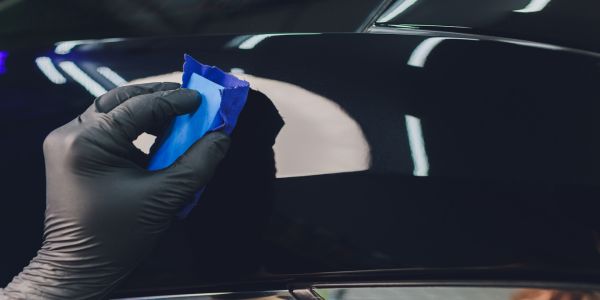
Pros of DIY Ceramic Coating:
- Cost-Effectiveness: DIY ceramic coating kits are readily available and cost significantly less than professional services, making it an attractive option for budget-conscious car enthusiasts.
- Convenience: You can schedule the application at your own pace, avoiding the need to drop off your car at a detailer’s shop.
- Satisfaction of Doing It Yourself: For some, there’s immense satisfaction in completing a car care task personally and achieving professional-looking results.
Cons of DIY Ceramic Coating:
- Skill and Knowledge Requirement: While DIY kits are designed for enthusiasts, there’s still a learning curve involved. Understanding the application process, surface preparation, and curing times is crucial for a successful outcome.
- Time-Consuming Process: Applying ceramic coating requires meticulous surface preparation, including washing, decontaminating, and potentially correcting paint imperfections. This process can be time-consuming.
- Potential for Mistakes and Damage: Inexperience or rushing through the process can lead to mistakes, uneven application, or damage to your car’s paint. This may require professional correction.
Tips and Advice for DIY Ceramic Coating:
- Read and Follow Instructions: Carefully read and adhere to the manufacturer’s instructions provided with the ceramic coating kit. Following the guidelines is critical for a successful application.
- Prepare the Surface: Properly clean, decontaminate, and, if necessary, correct your car’s paint before applying the coating. A well-prepared surface ensures better bonding and longevity.
- Practice on a Small Area: If you’re new to ceramic coating, consider practicing on a small, inconspicuous area to get a feel for the process and product.
- Work in Ideal Conditions: Apply the coating in a controlled environment with minimal dust and optimal temperature and humidity levels.
- Use Protective Gear: Wear gloves and safety glasses to protect yourself from chemicals and minimize contact with the coating.
- Regular Maintenance: After coating your car, maintain it using pH-neutral or ceramic coating-specific car wash products to preserve the coating’s integrity.
In conclusion, while it’s possible to ceramic coat your own car, it requires careful preparation, patience, and attention to detail. With the right approach and knowledge, you can achieve the benefits of ceramic coating while enjoying the satisfaction of a DIY project.
When to Seek Professional Help for Ceramic Coating
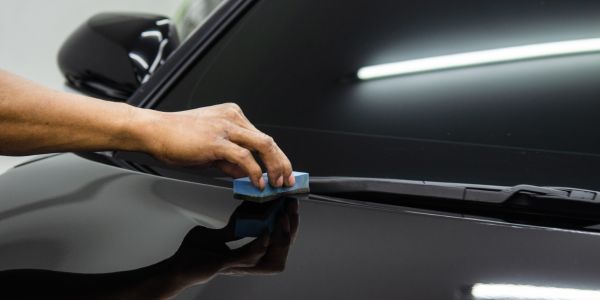
While DIY ceramic coating can be a rewarding endeavor, there are situations where it’s best to seek professional help. Here are some scenarios where professional ceramic coating services may be the better choice:
1. Complex Surfaces: If your car has intricate bodywork, unique materials, or delicate surfaces, professional detailers have the experience to navigate these challenges without causing damage.
2. Lack of Experience: If you’re new to ceramic coating, especially with a high-value or luxury vehicle, professional detailers can ensure a flawless application and reduce the risk of errors.
3. Time Constraints: Applying ceramic coating requires meticulous preparation and curing times. If you have a busy schedule or limited time for the application process, professionals can expedite the job without compromising quality.
4. Extensive Paint Correction: If your car’s paint has extensive imperfections, swirl marks, or deep scratches, professional detailers can perform advanced paint correction to restore the finish before coating.
5. Warranty and Certification: Many professional ceramic coating services offer warranties and certifications, providing added peace of mind and assurance of quality.
Benefits of Professional Ceramic Coating Services:
Expertise: Professional detailers are trained and experienced in ceramic coating applications, ensuring precise and effective results.
High-Quality Products: Reputable detailers use premium ceramic coating products that may not be readily available to consumers.
Advanced Equipment: Professionals have access to advanced tools and equipment, which can result in a superior finish.
Time Savings: Professional services are typically faster, allowing you to enjoy the benefits of ceramic coating without the time investment.
Reputable Ceramic Coating Services:
When seeking professional ceramic coating services, consider the following tips:
- Check Reviews: Look for online reviews and testimonials to gauge the reputation and quality of the service provider.
- Ask for Recommendations: Seek recommendations from friends, family, or car enthusiasts who have had positive experiences with specific detailers.
- Visit Their Facility: If possible, visit the detailing facility to assess their professionalism, cleanliness, and equipment.
- Inquire About Certification: Ask if the detailer is certified by a recognized ceramic coating manufacturer.
- Discuss Warranty: Inquire about warranty options to ensure your investment is protected.
In conclusion, while DIY ceramic coating can be satisfying, there are circumstances where professional help is the wiser choice. Professionals offer expertise, high-quality products, and time-saving solutions, ensuring your car receives the best possible ceramic coating treatment.
Frequently Asked Questions About Ceramic Coating
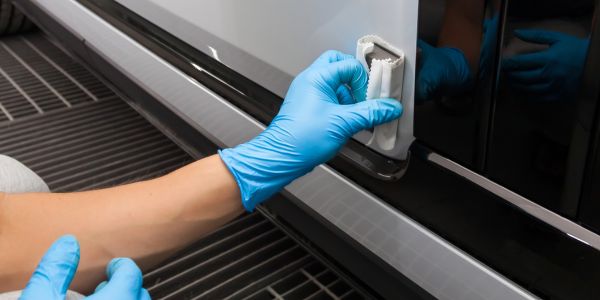
How long does a ceramic coating last?
Ceramic coating durability varies depending on factors like product quality, maintenance, and environmental conditions. On average, a well-maintained ceramic coating can last from 2 to 5 years.
Can I apply ceramic coating on top of existing wax or sealant?
It’s not recommended to apply ceramic coating over wax or sealant as it may hinder the bonding of the ceramic coating to the paint surface. For the best results, start with a clean and bare surface.
Is professional application better than DIY?
The choice between professional and DIY application depends on your experience, the condition of your vehicle, and your time availability. Professionals bring expertise and advanced equipment, but DIY can be cost-effective if done correctly. Evaluate your needs and skills to make an informed choice.
Conclusion
In the world of automotive care, the question of whether you can ceramic coat your own car often comes down to personal preference, skills, and circumstances. As we’ve explored, there are undeniable benefits to both DIY ceramic coating and seeking professional services.
For the skilled and patient DIY enthusiast, ceramic coating offers the opportunity to protect their vehicle while enjoying the satisfaction of a job well done. It’s a cost-effective solution that can provide long-lasting benefits when executed correctly.
However, there are instances where seeking professional help makes more sense, such as for complex surfaces, lack of experience, or time constraints. Professionals bring expertise, high-quality products, and advanced equipment to the table, ensuring a superior finish and peace of mind.
Ultimately, the choice between DIY and professional ceramic coating depends on your individual needs and preferences. Whichever path you choose, the key is to prioritize proper preparation, application, and maintenance, ensuring that your car remains protected, glossy, and turning heads on the road.